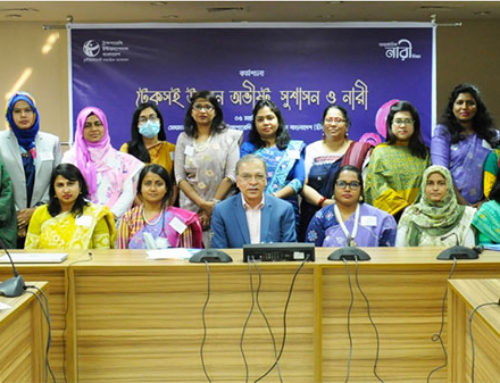Being a member of the fishermen community; Rinki Rani Das has witnessed the struggles and challenges of the community as the sufferer. Although it was absent in her thought that besides them there are other deprived communities living in her surroundings too. As a fellow of Community Radio Bikrampur, she witnessed various aspects of different communities during her works.
Rinki shared -`I met a girl of gypsi communities namely Sumi Akhter in the remote islands of Munshiganj while covering a feature on building awareness during the transition period of adolescent girls. Despite living in the floating life, it was very surprising to find her with such brilliant and appealing ideas which inspired me to make a separate story of her. I developed and broadcasted it. Immediately after the broadcasting, this program gained popularity by the audiences.
Besides, I made a live-show with Sumi later on. From this, as a volunteer, gradually she has become a part of Community Radio Bikrampur. Due to poverty; Sumi couldn’t be able to continue her education after completion of her five grade. But now she got herself admitted to a school again! Sumi has been a role-model of her community now. It may be considered too many of us that the story of Sumi is nothing new of its kind, but to me, it’s like discovering something! Being a journalist, I want to pick thousands of inspiring stories like that of Sumi.’
Bangladesh NGO’s Network for Radio and Communication (BNNRC), in partnership with Free Press Unlimited (FPU), launched fellowship program entitled “Fellowship for Youth women in Media and Journalism” since 2013. In the meanwhile, the program “Fellowship” has created many success stories at the rural communities’ level. For an example- Rural female journalists are now stepping out into creating some change makers like Rinki Rani Das who are representing the underprivileged communities as well as their changes. They also help to link the deprived people with the mainstream to get their rights.
In this connection, BNNRC has started its Fellowship Program for the Dalit Youth and Youth Women. The duration of the Fellowship Program is three months. This is the sixth batch of the program engaging the rural marginalized youth communities. This activity has started on 1st June 2017 and will continue up to 31st August 2017. The objective of the program is to facilitate in creating an enabling environment for the young women and enrolled in the media and journalism for developing as professional community media journalist in line with the Sustainable Development Goal 10.
A total 18 fellows are obtaining the training where 14 are youth women and 4 are youth representing 11 community radio stations. The fellows are: Johan Soren (Community Radio Padma, Rajshahi), Dalia Akter (Community Radio Lokobetar, Barguna), Sunity Sinha (Community Radio Pollikantho, Moulvibazar), Sharmin Akter and Farhana Akter (Community Radio Mukti, Bogra), Jahangir Alam & Nomita Chowdhury (Community Radio Mahananda, Chapainawabganj), Luttfonnahar & Sharmin Nahar (Community Radio Chilmari, Kurigram), Sharmin Akhtar Ankhi, (Community Radio Sundarban, Khulna) Moly Rani Das & Hridoy Lal (Community Radio Bikrampur, Munshiganj) Tumpa Rani Paul & Subrata Halder (Community Borendra Radio, Naogaon), Lima Begum & Kamrun Nanar Tania (Community Radio Meghna, Bhola Island), Lata Rani Rabidas & Khilon Das (Community Radio Sarabela, Gaibandha).
It is to be mentioned here that this is first-time that youth male from the Dalit communities has been engaging in the fellowship program. They will produce 108 radio news bulletin, 108 Radio feature, 54 reports/article for local press about their community problem, challenges and way forward. In the beginning, the fellows and mentors (attached to each fellow, representing the community radio station) have participated in a day-long orientation workshop at station level. The objective of the workshop was to provide orientation on the clear understanding of community media journalism and some technical knowledge regarding basic journalism, reporting formats and development issues etc.
The day long-orientation included sessions on basic journalism, radio news, radio reporting, techniques of radio program presentation, feature for print media, interview techniques and formatting of radio news with the special emphasis on women and children issues as well as the use of social media. In each station, the sessions were facilitated by two prominent journalists from local print media and electronic media.
After having the orientation, the fellows started work under the guidance of a mentor. It should be mentioned that a mentor is engaged with the fellows in each station.
The Fellows of the current batch are not only covering the issues related to women and child. They also cover all governments provided social safety net issues (allowance of a senior citizen, windows, persons with disabling, transgender etc.). Besides reporting, the fellows are learning recording, script writing, audio editing, news presentation, handle audio mixing and use of Internet. Side by side they keep follow-up the cases and ensure the services allocated for the target right-holders, especially of the Dalit communities.
These fellows are also working for their unemployed youth Dalit male and females to involve various government and non-government provided skill development services. Besides this, the Fellows are also contributing in creating awareness among their communities to receive various free services of the government, such as community clinics, digital information service, legal aid, help lines on child protection, gender based violence etc. Since 2013, under this program, a number of 87 youth women received fellowship on journalism at 16 community radio stations. Among them, 60 youth women have come from Dalits community.
The fellowship program “Youth Women in Community Media and Journalism” received the UN World Summit on Information Society (WSIS) Prize 2016 for Media category C-9.




